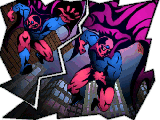  |
|
  |
|
The rules presented here are a significant modification and simplification of the rules available in the Fudge rulebook. The original rules are available for free download from Grey Ghost Games, or you can buy a printed rulebook -- from Amazon, for example.
There's also a review of Fudge Expanded Edition on Pyramid Magazine. You won't be able to read this if you don't have a subscription to Pyramid. If you choose to subscribe, tell 'em konig sent ya.
Fudge is an excellent game, and I highly recommend it as a good trade for a bit of your hard-earned money.
Using the Dice
Every time a character acts, she rolls 4DF (four Fudge dice). Fudge dice are six-sided dice, two sides marked with a [+], two with a [-], and two with nothing. Each [+] rolled adds one to the roll, every [-] subtracts 1, and the blank sides add nothing to the roll.
For example, [+] [+] [+] [+] = 4, the highest possible roll in Fudge.
[-] [-] [-] [-] = -4, the lowest possible roll in Fudge.
[ ] [ ] [ ] [ ] = 0
[-] [+] [ ] [+] = 1
Got it?
17-18
=
4
16
=
3
14-15
=
2
12-13
=
1
10-11
=
0
8-9
=
-1
6-7
=
-2
5
=
-3
3-4
=
-4
 If
you haven't got Fudge dice, roll 3D6.
If
you haven't got Fudge dice, roll 3D6.
After you roll your Fudge dice, add the attribute score the game master says is most relevant. If the game master says it's alright, you may add discipline coins as well.
Character Creation
Attributes
Attributes are the basic measures of a character's ability, the abilities that are common to all humans regardless of training or superhuman powers. The represent core potential - although many are improved with exercise.
+3
+2
+1
0
-1
-2
-3
 Each attribute score is rated as follows:
Each attribute score is rated as follows:
Superb
Great
Good
Fair
Mediocre
Poor
Terrible
Attributes above Superb are only possible with superhuman powers.
The attribute numbers are added to a Fudge roll. The game master determines which attribute is relevant to any given roll.
Disciplines
Unlike attributes, disciplines aren't common to every character, but are gained through training and practice. They represent fields of study, or occupations. They can be very narrow fields, or very specific, but balance out; a character with the Cabinetmaker discipline makes much better cabinets than a character with the Carpenter discipline at the same level, but the Carpenter character is much better then the Cabinetmaker at making other kinds of wooden constructs.
Specific disciplines: Motorcyclist, Research Scientist, PHP Programmer, Helicopter Pilot, Nepalese Seasonal Rite Expert, Cabinetmaker, Mustang Restorer, Football Kicker.
Characters may have nearly any discipline that fits their character's background, subject to game master approval. Most characters have several disciplines.
Each discipline will apply in a huge number of situations, all of them subject to the game master's discretion.
Often, disciplines will allow characters to succeed at actions automatically, without requiring a roll, when the game master decides that a character with that level of discipline wouldn't really have a chance of not knowing how to accomplish something predictably. A discipline is also assumed to include certain knowledge, which the character knows pretty much automatically. Even a hobbyist computer tech would instantly distinguish a sound card from a video card or an internal modem, but someone without the discipline probably wouldn't.
 Very
often, a discipline will give a character contacts. You don't teach English at a university without knowing other
English teachers in your department, some professors you studied under as a student yourself, and some university
administration, at least. High level disciplines, experts and masters, will additionally have a bit of fame in
their field. That doesn't mean a clerk in a 7-11 is going to recognize one of the world's top authorities on Renaissance
art, but other Renaissance art buffs, even hobbyists, will. Unless it's inappropriate for the discipline or for
a character's background, a small degree of fame and authority is automatic at these higher levels.
Very
often, a discipline will give a character contacts. You don't teach English at a university without knowing other
English teachers in your department, some professors you studied under as a student yourself, and some university
administration, at least. High level disciplines, experts and masters, will additionally have a bit of fame in
their field. That doesn't mean a clerk in a 7-11 is going to recognize one of the world's top authorities on Renaissance
art, but other Renaissance art buffs, even hobbyists, will. Unless it's inappropriate for the discipline or for
a character's background, a small degree of fame and authority is automatic at these higher levels.
Most practically, a discipline adds to rolls when the game master deems it appropriate. Unlike Fudge dice or attributes, disciplines add a coin to a relevant roll. For each coin added by the discipline, flip -- well, a coin. Heads, you add a point (your discipline training was relevant); tails, you add nothing (you never studied that situation, or you weren't prepared to apply your training). Better yet, use an Othello marker, and add one for white, none for black.
Now, not every discipline will add its full coin value to every relevant roll. The game master may decide that your discipline doesn't apply fully, and will tell you to add fewer coins. That's life. A Falconer character may know a thing or two about birds of prey, but her knowledge is only marginally relevant to identifying diseases in racing pigeons when it comes time to make that roll.
Disciplines are rated as follows: Hobbyist
Student
Professional
Expert
Master
You've dabbled in the field, read a book or two on the subject. You have some practical
knowledge, but you certainly couldn't handle many advanced situations.
Bonuses: auto-successes, assumed knowledge, usually no bonus to rolls.
You've formally studied the field, and you're prepared to make judgments and know
what to expect in most circumstances.
Bonuses: auto-successes, assumed knowledge, contacts, +1 coin to most rolls.
You've practiced in the field, and possibly trained beginning students. There are
few circumstances that surprise you when it comes to your field, because of your experience.Bonuses: auto-successes,
assumed knowledge, contacts, +2 coins to most rolls.
You've trained well beyond most practiced professionals, and there's a good chance
you've achieved some recognition and authority in the field for your skills -- perhaps you've published a book,
or run some seminars.Bonuses: auto-successes, assumed knowledge, contacts, fame, +3 coins to most rolls.
You're an expert's expert, a leading authority in your discipline. You're world class,
and those knowledgeable in your field likely know your name. You've probably devoted your entire life to the discipline,
and chances are you're not very good - never attained professional level - at anything else.Bonuses: auto-successes,
assumed knowledge, contacts, fame, +4 coins to most rolls.
It's possible to have disciplines above Master (Super Master is +5), but it's extremely rare. For practical purposes, player characters won't generally be able to sustain any discipline above the level of Professional, at most one discipline at Expert level, without devoting every waking minute to the discipline.
Gifts and Faults
Gifts and Faults are character quirks, usually minor, that respectively help or hinder a character. They can include loads of things not covered by attributes and disciplines, but they fall within the range of possibility for normal humans.
Powers
Powers are the heart of any SuperFudge character, but the least predictable. Powers will be developed with your game master, and will vary wildly in effect and strength. No two supers have exactly the same powers, so no attempt to detail them will be made here.
 Guidelines
for powers:
Guidelines
for powers:
Point Values
Characters are measured in Fudge points. Your game master will tell you how many Fudge points to spend at each part of character creation.
Attributes 15
10
8
7
3
5
0
4
-3
7
-8
15
-15
20
Rating
Cost at creation
Cost to raise from lower level during game
Superb
Great
Good
Fair
Mediocre
Poor
Terrible
Disciplines 15
6
10
5
6
4
3
3
1
2
Level
Cost at creation
Cost to raise from lower level during game
Master
Expert
Professional
Student
Hobby
Gifts and Faults
Gifts cost one point, and Faults give the character one extra point. Some
Gifts and Faults may be worth one more point, so check with your game master.
 Combat
Combat
Conflict is at the heart of every good story, and supers are in the midst of plenty of conflict. Much of it will be physical conflict, with street thugs, henchmen, and super villains.
Each character in a combat may normally attack once per round.
Beginning a Round
At the beginning of a round, decide on your combat tactics by selecting an offensive modifier between -2 and +2.
Your defensive modifier is the negative value of your offensive modifier. Everyone involved in a combat selects
tactics secretly and simultaneously. Indicate your tactics by setting two Fudge dice to the desired offensive modifier
(the defensive modifier is implied), or by setting 1D6 as listed:
| D6 |
Off. Modifier |
Def. Modifier |
| 6 |
+2 |
-2 |
| 5 |
+1 |
-1 |
| 3,4 |
0 |
0 |
| 2 |
-1 |
+1 |
| 1 |
-2 |
+2 |
Offensive Rolls
Everyone involved in the combat describes what they're doing. If anyone disputes order of announcement, characters with the highest offensive modifiers announce first. The game master announces what attributes will be used in each roll, and answers questions about applicable disciplines. Finally, everyone involved in the combat makes offensive rolls simultaneously.
Generally, the attribute modifier will be based on the following attributes:
The outcome is:
Offensive rolls are resolved in the order of highest to lowest.
Defensive Rolls
When a character is attacked by another, she makes a defensive roll. A character can make a defensive roll every time she is attacked, no matter how many times she's attacked in a round, but may only add her Quickness modifier once. However, she may split up her Quickness modifier over several defensive rolls within the same round. Quickness modifier points not used from one round will carry over into the next, but must be used up on the first Defensive roll of the next round (this is how negative modifiers can be defrayed, and possibly not applied until the next round).
The outcome is:
Wounds
Subtract the defensive roll from the offensive rolls. The target of the attack
sustains wounds as follows:
0 or less
Undamaged
No wounds at all. The character doesn't have any combat wounds.
1, 2
Just a Scratch
A graze, bruise, cut, abrasion, etc. No real game effect.
3, 4
Hurt
The character is wounded significantly, enough to slow her down. -1 to all rolls
which would logically be effected.
5, 6
Very Hurt
The character is seriously hurt, possibly stumbling. -2 to all rolls which would
logically be effected.
7, 8
Incapacitated
The character is so badly wounded as to be incapable of any actions, except possibly
dragging herself a few feet every now and then or gasping out an important message.
9+
Near Death
The character is not only unconscious, but will die in less than an hour - maybe
a lot less - without medical help. No one recovers from Near Death on her own unless very lucky.
Whenever characters suffer a wound, check one of the appropriate boxes on the
wound track. A player character's wound track looks like this:
Scratch
Hurt (-1)
Very Hurt (-2)
Incapacitated
Near Death
[ ] [ ] [ ] [ ]
[ ] [ ] [ ]
[ ]
[ ]
[ ]
1, 2
3, 4
5, 6
7, 8
9+
Every time a wound is sustained, mark a box at the appropriate level. If all boxes at that level are marked, and a new wound is sustained at that level, mark a box at the next available level. So if all the Hurt boxes are marked, mark a box in Very Hurt.
Penalties from multiple wounds aren't cumulative. Just count the worst wound. So a character who has two Hurt boxes and a Very Hurt box marked is at -2 to rolls.
NPCs may have different wound tracks, generally shortened to reflect their importance to the game.
Fudge Points and Karma Dice
The system of rewards and punishments in SuperFudge is Karma Dice, which are translated into Fudge points at the end of every session.
Karma Dice
 Karma
dice are a concept I borrowed from John Wick, and I feel the concept applies very nicely to SuperFudge. It requires
a handful of black counters, a handful of white counters, and a bowl. Little dice work nicely for the black and
white counters, because you can by them in large quantities. The idea is pretty simple.
Karma
dice are a concept I borrowed from John Wick, and I feel the concept applies very nicely to SuperFudge. It requires
a handful of black counters, a handful of white counters, and a bowl. Little dice work nicely for the black and
white counters, because you can by them in large quantities. The idea is pretty simple.
First, when players do something the game master doesn't like, the game master drops a black die into the bowl.
Plink!
Any time a player is making an important roll, the game master may remove one of the black dice and say, "You fail."
It works the other way, too. When the players do something great, something heroic, something really special, the game master can drop a white die into the bowl.
Plink!
Any time a player is making an important roll, any other player may remove one of the white dice and say, "You succeed!"
The idea here is to give the game master a bit of punishment/reward power that is quick and easy, and that stays, very visually, in the players' minds during the game. It also allows takes some of the creative control of the game away from the dice, and gives it back to the game master and to the player.
It's easy to get heavy-handed with karma dice. Some guidelines:
Fudge Points
Fudge points are used for advancement, and they come out of karma dice. At the end of a session, subtract the black karma dice from the white karma dice. The players get that many Fudge points, and they decide amongst themselves who gets what, because they're a team. They must be distributed right then, but players may wait to spend them.
Fudge dice are used to improve character stats (See the "Character Creation" section above), and might be traded for other perks relating to the game. Talk to your game master.
| by McRey "Mac" Moyer |
